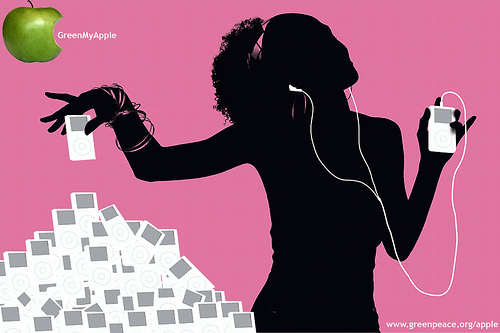Der Apfel muss noch nachgrünen
January 20th, 2010 by Kris

Die Kampagne Green my Apple war erfolgreich. Umweltsünden und unfaire Arbeitsverhältnisse passen einfach nicht zum menschlichsten aller Computer-Brands. Also versprach Apple Besserung und tat auch wirklich etwas, wie am Greener Electronics Ranking ablesbar ist. Verbrauchermacht wirkt, wenn das Image in Gefahr ist.
Doch jetzt kommt die Meldung, daß u.a. das iPhone-Display beim taiwanischen Zulieferer Wintek unter bedenklichen Umständen hergestellt wird, weshalb diesmal die Arbeiter vor Ort protestieren – (noch) nicht die Verbraucher. Wintek hat bereits reagiert und behauptet, daß die Arbeiter ihre versprochenen Boni erhalten und der Giftsoff n-hexane bereits seit August nicht mehr verwendet werden würde. Von Apple selbst ist mir noch keine Reaktion bekannt. Apple dürfte empfindlicher reagieren, wenn sich diese Nachricht verbreitet und das saubere Image in Gefahr kommt. Denn der Wert von Apple liegt ja weniger in Displays oder vielmehr der Produktion an sich als im Image, also in den Kommunikationen und Köpfen der Konsumenten. Und wenn sich da schlechte Assoziationen einschleichen, dann ist das wirklich Gift für Apple.
Kommentator TehSilentWolf auf engadget bringt’s auf dem Punkt, wie solch ausbeuterischen Umstände zu Stande kommen:
Its the big companies that squeeze the manufacturers to the limit. Like say if a computer company wanted them to make cheaper LCD’s then they would ask them to keep the price down, which then makes the manufacturer have to compromise on working conditions.
—
Apple has a big event planned for the end of the month, when the company is supposed to unveil its rumored tablet and perhaps a new iPhone OS, but the workers who make screens used by Apple are a lot more concerned about getting paid and whether they’ve been made to work with hazardous materials.
aus einem Beitrag auf truthdig.com.
—
Apple’s overseas manufacturing partners have been the subject of much scrutiny over the years. Last July, an audit of Apple’s partners in mainland China found that 45 of 83 factories that built iPhones and iPods in 2008 weren’t paying valid overtime rates for those workers that qualified. In addition, 23 of those factories weren’t even paying some of their workers China’s minimum wage.
aus einem Artikel zum Thema auf Apple Insider
—
The Taiwanese company’s East China factory ground to a halt last Friday morning, while about 2,000 of its 10,000 workers went on a five-hour protest over a rumored bonus cancellation for the second year in a row. On top of that, workers also criticized Wintek for using n-hexane — a banned substance used for cleaning LCDs — which they claim caused the death and paralyzation of several workers last year. Factory officials and Chinese health authorities don’t deny that n-hexane was used, but they say it wasn’t responsible for either the deaths or the paralyzations. Now, the good news: Wintek has promised that workers will get their bonuses, and further said that the factory hasn’t used n-hexane since August — complete with proof that current n-hexane levels are lower than safety regulations require.
Auszug aus einem Artikel auf engadget.com.
—
… und aus China berichten dailynews.sina.com (google Übersetzung) backchina.com (google Übersetzung) mit Video: